2020届中考必备语法-状语从句及练习题(含答案)
文档属性
| 名称 | 2020届中考必备语法-状语从句及练习题(含答案) | 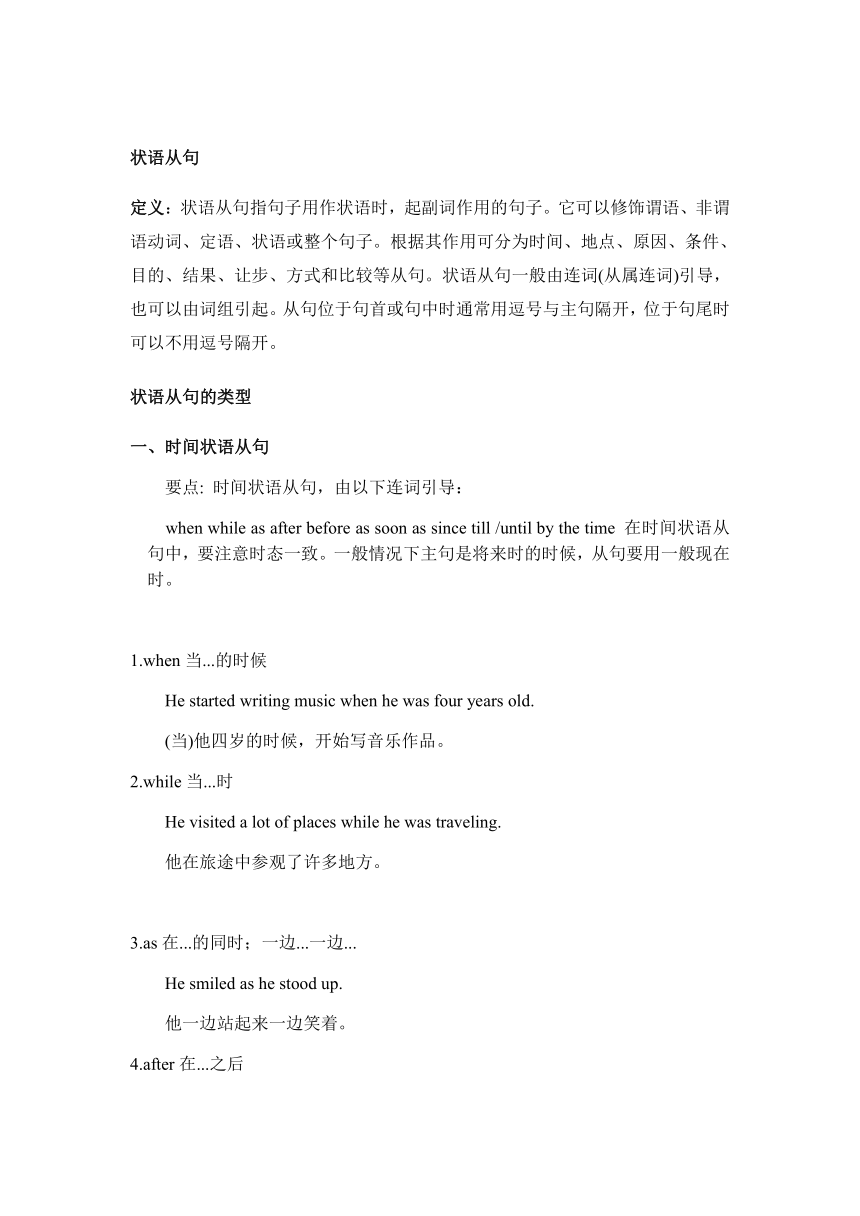 | |
| 格式 | zip | ||
| 文件大小 | 31.4KB | ||
| 资源类型 | 教案 | ||
| 版本资源 | 通用版 | ||
| 科目 | 英语 | ||
| 更新时间 | 2019-10-10 09:09:25 | ||
图片预览

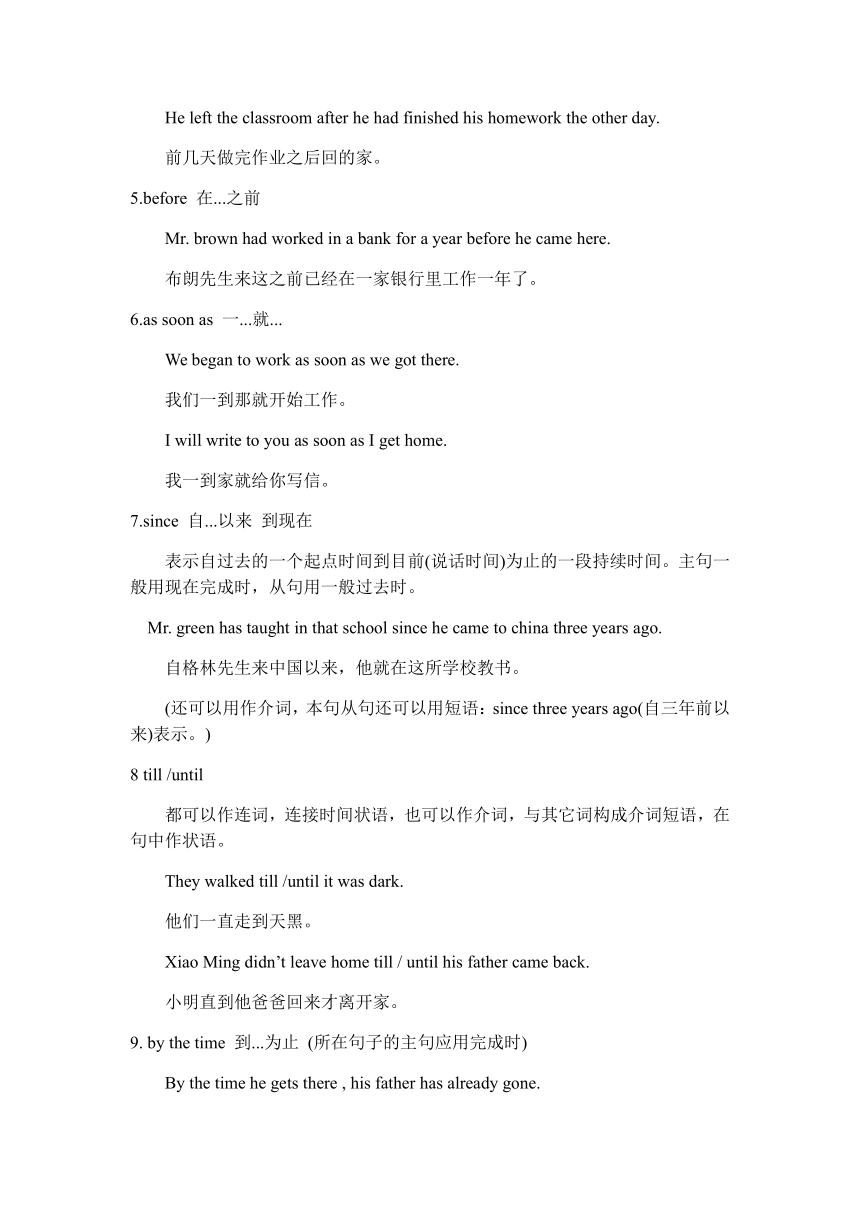
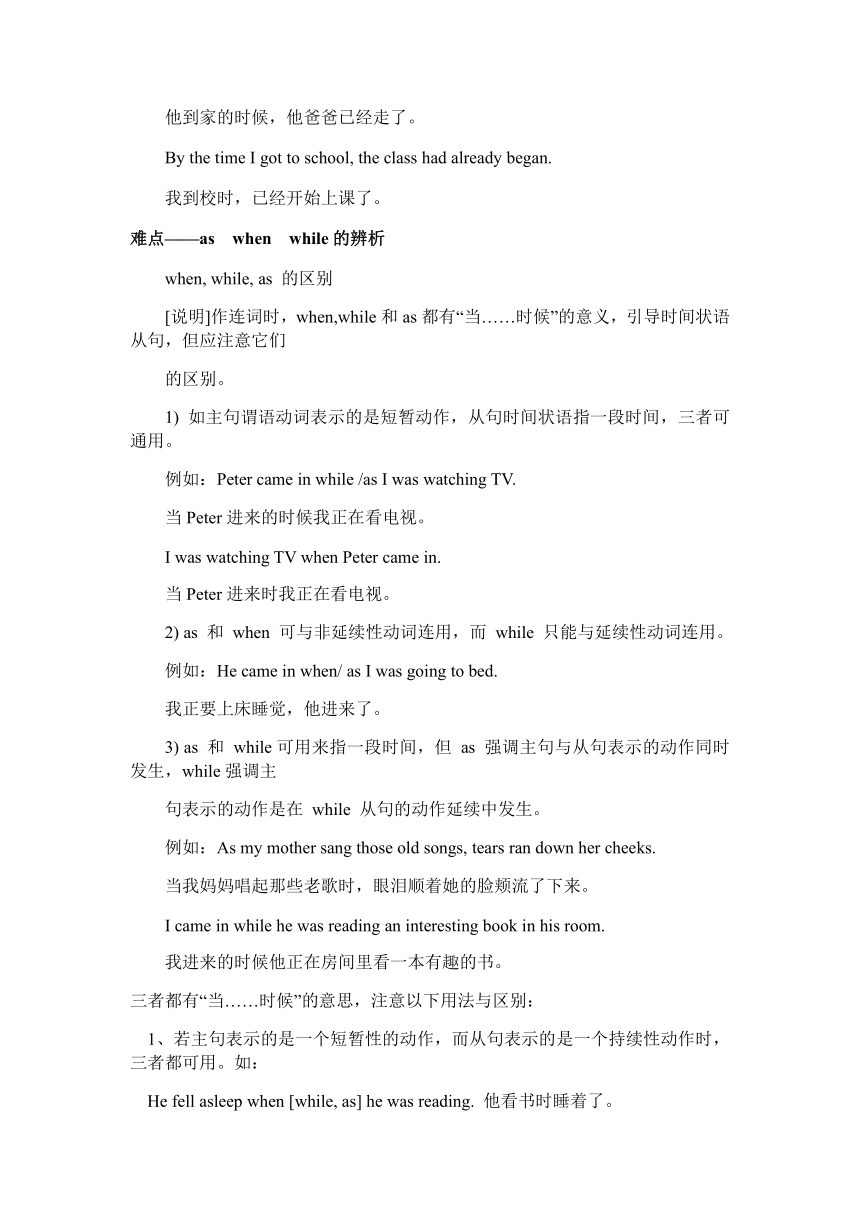
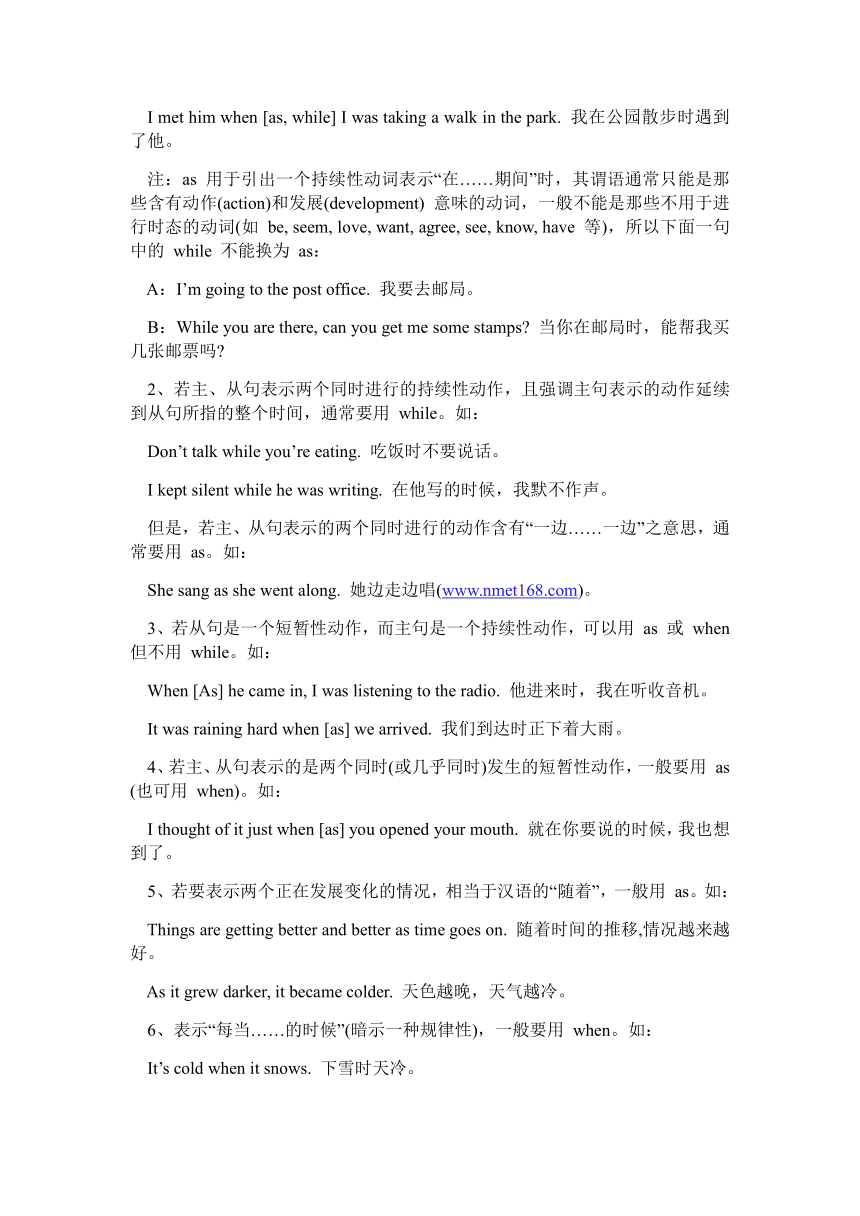
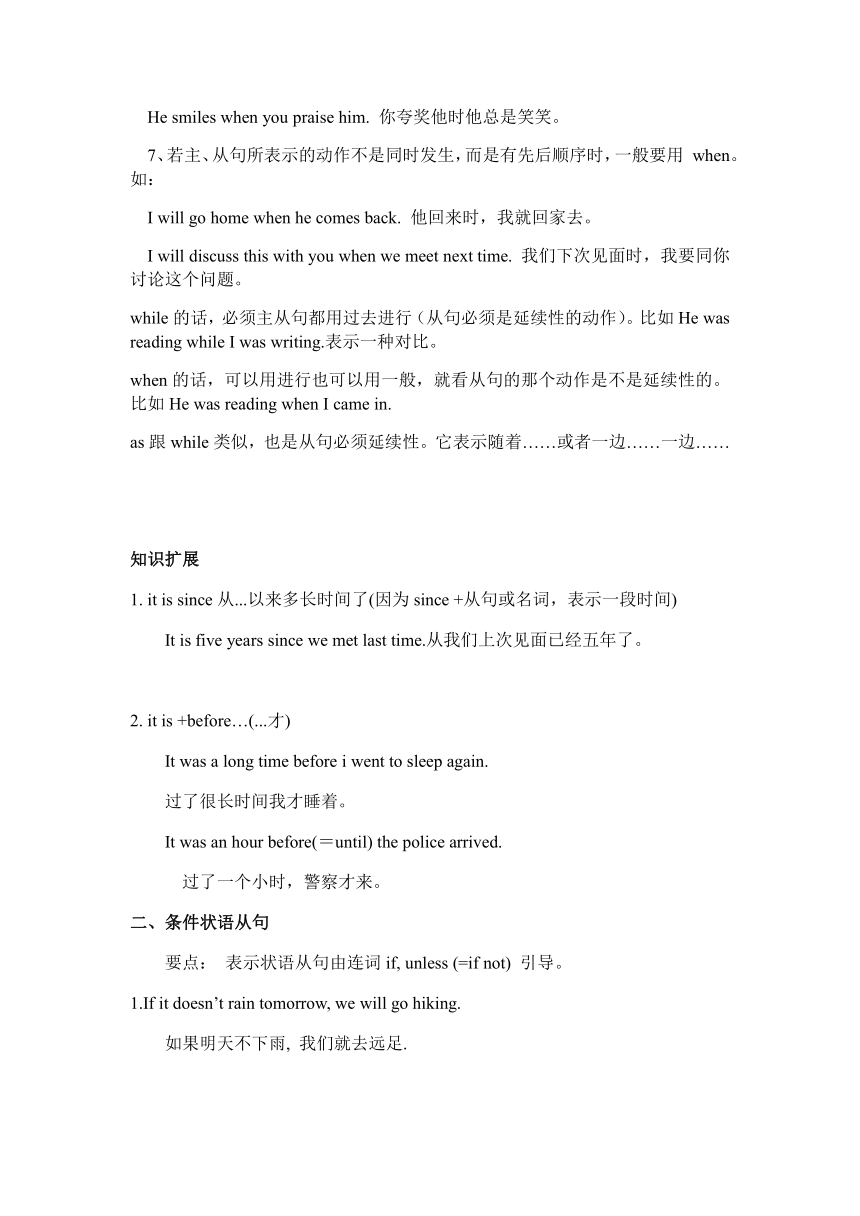
文档简介
状语从句
定义:状语从句指句子用作状语时,起副词作用的句子。它可以修饰谓语、非谓语动词、定语、状语或整个句子。根据其作用可分为时间、地点、原因、条件、目的、结果、让步、方式和比较等从句。状语从句一般由连词(从属连词)引导,也可以由词组引起。从句位于句首或句中时通常用逗号与主句隔开,位于句尾时可以不用逗号隔开。
状语从句的类型
一、时间状语从句
要点: 时间状语从句,由以下连词引导:
when while as after before as soon as since till /until by the time 在时间状语从句中,要注意时态一致。一般情况下主句是将来时的时候,从句要用一般现在时。
1.when当...的时候
He started writing music when he was four years old.
(当)他四岁的时候,开始写音乐作品。
2.while当...时
He visited a lot of places while he was traveling.
他在旅途中参观了许多地方。
3.as在...的同时;一边...一边...
He smiled as he stood up.
他一边站起来一边笑着。
4.after在...之后
He left the classroom after he had finished his homework the other day.
前几天做完作业之后回的家。
5.before 在...之前
Mr. brown had worked in a bank for a year before he came here.
布朗先生来这之前已经在一家银行里工作一年了。
6.as soon as 一...就...
We began to work as soon as we got there.
我们一到那就开始工作。
I will write to you as soon as I get home.
我一到家就给你写信。
7.since 自...以来 到现在
表示自过去的一个起点时间到目前(说话时间)为止的一段持续时间。主句一般用现在完成时,从句用一般过去时。
Mr. green has taught in that school since he came to china three years ago.
自格林先生来中国以来,他就在这所学校教书。
(还可以用作介词,本句从句还可以用短语:since three years ago(自三年前以来)表示。)
8 till /until
都可以作连词,连接时间状语,也可以作介词,与其它词构成介词短语,在句中作状语。
They walked till /until it was dark.
他们一直走到天黑。
Xiao Ming didn’t leave home till / until his father came back.
小明直到他爸爸回来才离开家。
9. by the time 到...为止 (所在句子的主句应用完成时)
By the time he gets there , his father has already gone.
他到家的时候,他爸爸已经走了。
By the time I got to school, the class had already began.
我到校时,已经开始上课了。
难点——as when while的辨析
when, while, as 的区别
[说明]作连词时,when,while和as都有“当……时候”的意义,引导时间状语从句,但应注意它们
的区别。
1) 如主句谓语动词表示的是短暂动作,从句时间状语指一段时间,三者可通用。
例如:Peter came in while /as I was watching TV.
当Peter进来的时候我正在看电视。
I was watching TV when Peter came in.
当Peter进来时我正在看电视。
2) as 和 when 可与非延续性动词连用,而 while 只能与延续性动词连用。
例如:He came in when/ as I was going to bed.
我正要上床睡觉,他进来了。
3) as 和 while可用来指一段时间,但 as 强调主句与从句表示的动作同时发生,while强调主
句表示的动作是在 while 从句的动作延续中发生。
例如:As my mother sang those old songs, tears ran down her cheeks.
当我妈妈唱起那些老歌时,眼泪顺着她的脸颊流了下来。
I came in while he was reading an interesting book in his room.
我进来的时候他正在房间里看一本有趣的书。
三者都有“当……时候”的意思,注意以下用法与区别:
1、若主句表示的是一个短暂性的动作,而从句表示的是一个持续性动作时,三者都可用。如:
He fell asleep when [while, as] he was reading. 他看书时睡着了。
I met him when [as, while] I was taking a walk in the park. 我在公园散步时遇到了他。
注:as 用于引出一个持续性动词表示“在……期间”时,其谓语通常只能是那些含有动作(action)和发展(development) 意味的动词,一般不能是那些不用于进行时态的动词(如 be, seem, love, want, agree, see, know, have 等),所以下面一句中的 while 不能换为 as:
A:I’m going to the post office. 我要去邮局。
B:While you are there, can you get me some stamps? 当你在邮局时,能帮我买几张邮票吗?
2、若主、从句表示两个同时进行的持续性动作,且强调主句表示的动作延续到从句所指的整个时间,通常要用 while。如:
Don’t talk while you’re eating. 吃饭时不要说话。
I kept silent while he was writing. 在他写的时候,我默不作声。
但是,若主、从句表示的两个同时进行的动作含有“一边……一边”之意思,通常要用 as。如:
She sang as she went along. 她边走边唱(www.nmet168.com)。
3、若从句是一个短暂性动作,而主句是一个持续性动作,可以用 as 或 when 但不用 while。如:
When [As] he came in, I was listening to the radio. 他进来时,我在听收音机。
It was raining hard when [as] we arrived. 我们到达时正下着大雨。
4、若主、从句表示的是两个同时(或几乎同时)发生的短暂性动作,一般要用 as (也可用 when)。如:
I thought of it just when [as] you opened your mouth. 就在你要说的时候,我也想到了。
5、若要表示两个正在发展变化的情况,相当于汉语的“随着”,一般用 as。如:
Things are getting better and better as time goes on. 随着时间的推移,情况越来越好。
As it grew darker, it became colder. 天色越晚,天气越冷。
6、表示“每当……的时候”(暗示一种规律性),一般要用 when。如:
It’s cold when it snows. 下雪时天冷。
He smiles when you praise him. 你夸奖他时他总是笑笑。
7、若主、从句所表示的动作不是同时发生,而是有先后顺序时,一般要用 when。如:
I will go home when he comes back. 他回来时,我就回家去。
I will discuss this with you when we meet next time. 我们下次见面时,我要同你讨论这个问题。
while的话,必须主从句都用过去进行(从句必须是延续性的动作)。比如He was reading while I was writing.表示一种对比。
when的话,可以用进行也可以用一般,就看从句的那个动作是不是延续性的。比如He was reading when I came in.
as跟while类似,也是从句必须延续性。它表示随着……或者一边……一边……
知识扩展
1. it is since从...以来多长时间了(因为since +从句或名词,表示一段时间)
It is five years since we met last time.从我们上次见面已经五年了。
2. it is +before…(...才)
It was a long time before i went to sleep again.
过了很长时间我才睡着。
It was an hour before(=until) the police arrived.
过了一个小时,警察才来。
二、条件状语从句
要点: 表示状语从句由连词if, unless (=if not) 引导。
1.If it doesn’t rain tomorrow, we will go hiking.
如果明天不下雨, 我们就去远足.
2.You will get good grades if you study hard.
如果你努力学习,就会取得好成绩.
3.I will go to the party unless he goes there too.
我不会去参加聚会的, 除非他也去.(如果他不去,我也不去.)
4.You will be late unless you leave immediately.
如果你不马上走,你将会迟到的.(=if you don’t leave immediately, you will be late.)
难点提示:用条件状语从句时要注意时态的正确使用,当主句是将来时的时候,从句要用一般现在时.
He will not leave if it isn’t fine tomorrow.
一般将来时, 一般现在时
They are going to have a picnic if it doesn’t rain next week.
一般将来时, 一般现在时 考点
三、原因状语从句
要点: 由连词because, since, as引导, 也可由for, now that 等词引导
1.I didn’t go to school yesterday because i was ill.
我昨天没去上学,因为我生病了。
2. Since everybody is here, let’s begin our meeting.
既然大家都来了, 让我们开始开会吧.
3. As you are in poor health, you should not stay up late.
既然你身体不好, 你就不该熬夜.
4.I asked her to stay to tea, for i had something to tell her.
我请她留下来喝茶,因为我有事要告诉她.
难点——because , since , as , for,辨析
在语气上,because 最重, 表示的是直接理由,回答why 时只能用它. 其次是since, as ,一般不表示原因, 而是表明理由, 进一步说明.(译为:由于,既然). for 被认为是复合句的并列连词(常用于推断),表示理由.
四、地点状语从句
要点: 由连词where和复合关系词wherever (=no matter where )引导.
知识扩展
1.Where there is a will , there is a way.
有志者事竟成。(谚语)
2.Wherever you go , I go too.
无论你到什么地方,我都去。(wherever=no matter where)无论何处,多用于句首。
3.Wherever there is smoke , there is fire.
无风不起浪。(谚语)
4. While she was wondering where to go , she met a policeman.
疑问副词where后跟不定式,构成不定式短语. 考点
五、目的,结果状语从句
要点: 目的状语从句由连词that, so that, so…that , in order that 引导。
结果状语从句由连词( so )that, so…that, such…that, so much/many…that引导。
1.so…that 如此…以至于
The scientist’s report was so instructive that we were all very excited.
科学家的报告很有启发性,我们感到很兴奋。
He always studied so hard that he made great progress.
他总是那么努力,结果他取得了很大的进步。
2.so that 以至, 以便
I’ll run slowly so that you can catch up with me. (目的)
我将慢慢跑以至你能赶上我。
I opened the window so that fresh air might come in. (目的)
我把窗户打开以使新鲜空气可以进来。
3. such…that 如此...以至
It’s such nice weather that all of us want to go to the park.
天气是如此的好,我们大家都想去公园玩。
4.in order that=so that:为了
We shall let you know the details soon in order that you can/may make your arrangements.
不久我们将会让你知道详情,以便你们能够做出安排。(目的)
难点
+形容词或副词
+形+a(an)+单数可数名词
so +many 或few+复数可数名词 +that
+much或 little+不可数名词
so that ,such…that 都可以in order that两者皆可引导目的地状语从句和结果状语从句,
当他们引导目的状语从句时,从句的谓语里常常有can, could, may, might, will, would等次。
so +adj./adv.+ that, such +n.+ that 以上两种句型都表示结果,其中so为副词,后接形容词,副词原型,当可数名词前有many, few;不可数名词前有much, little修饰时,应采用句型:so many (few, much, little )+n. 。 such为形容词, 后只能接名词。这名词既可以地可数的,也可以是不可数的。如果这名词是可数,单数,则必须在名词前敬爱冠词a(an). 常见的形式是:such a (beautiful)garden, such(nice)people.
The weather is so nice that I’d like to take a walk.
天气是如此只好,以至于我想去散散步.
Mike is so honest a man that we all believe him.
麦克是如此诚实的一个人,以至于大家都相信他
(=Mike is such an honest man that we all believe him.) 考点
六、让步状语从句
要点: 表示让步的状语从句由连词 though, although引导.
难点:
though, although当虽然讲, 都不能和but连用. although,(though)…but的格式是不对的.但是他们都可以同yet (still) 连用. 所以thought (although)…yet(still)的格式是正确的.
wrong: Although he is rich but he is not happy.
right : Although he is rich, yet he is not happy.
虽然他很富有, 然而他并不快乐.
right : Although we have grown up, our parents treat us as children.
right : Although we have grown up, our parents still treat us as children.
尽管我们已经长大了,可是我们的父母仍把我们看作小孩.
although, though 辨析
although 不能though 那样用作副词, 放在句末表示强调时要用even though.
He is looking fit, though.
但是,他看上去很健康. 考点
Even though i didn’t under a word, i kept smiling.
尽管我一个字也不懂,我还是一直微笑着。
He is quite experienced, he is young, though.
尽管他很年轻,他很有经验。
七、比较状语从句
要点:比较状语从句主要运用于形容词和副词的原级,比较级及最高级的句子之中。
原级
1. as…as 和...一样
Jack is as tall as bob.
捷克和汤姆一样高。
2. not so(as)…as …和不一样
She is not so(as)outgoing as her sister.
她不如她姐姐外向。
比较级
more…than (更)
This book is more instructive than that one.
这本书比那本书由教育意义。
最高级
1.the most…in/of
This book is the most interesting of the three.
这本书是三本中最有趣的。
2. the + 形容词+est.…of/in
This road is the busiest street in our city.
这条路是我们城市最繁忙的街道。
总结:状语从句分类及常用连词:
类别 连 词
时间状语从句 when, whenever, while, as, before, after, since, till, once(一旦)
地点状语从句 where, wherever
原因状语从句 because, since, as, for, now that(既然,由于)etc. (et cetera,等于and so on)
目的状语从句 in order that(为了,以便), so that, that, etc.
结果状语从句 so…that, so that, such…that, that, etc.
条件状语从句 if, unless, as(so)long as, etc.
让步状语从句 though, although, even if, even though, however, whatever, as,etc.
比较状语从句 as…as, so…as, than, etc.
方式状语从句 as, as if, as though, etc.
|状语从句|
1.[2019·贵港]—Has the meeting begun yet?
—Not yet.We have to wait everyone is here.
A.and B.until C.or D.but
2.[2019·贵阳]Our eyesight will become poorer and poorer we keep playing with phones.
A.though B.unless C.if
3.[2019·本溪]—Lingling, you’ll feel sleepy tomorrow you go to bed early.
—OK, Mom.I’ll go to bed at once.
A.if B.unless
C.though D.because
4.[2019·盘锦]The old man leads a simple life, he has a lot of wealth.
A.although B.so
C.unless D.because
5.[2019·东营]—I’m afraid e-books might be bad for our eyes.
—Hmm, but they will be helpful for us we put them to good use.
A.as soon as B.as long as
C.even though D.so that
6.[2019·包头]It was the middle of the night the sound of the piano woke me up.
A.because B.if
C.when D.although
7.[2019·东营]—How time flies! The middle school life is coming to an end.
—Yes.We have to say goodbye, our friendship will last forever.
A.for B.but C.or D.so
8.Tony was drawing a picture I was doing my homework.
A.if B.because C.while D.until
9. Square Dancing is good exercise for the old, sometimes it makes a lot of noise.
A.If B.Although
C.Until D.Because
10.The manager of the hotel was waiting at the gate the guests arrived.
A.while B.when C.unless D.after
11. his right hand was hurt, he wrote slowly.
A.Because; so B.Because; /
C.Although; but D.Although; /
12.—Learning to love is like learning to walk.
—Yes, we step out bravely, we’ll find it’s not so difficult.
A.as if B.even though
C.as long as D.as far as
13.John thinks it won’t be long he is ready for his new job.
A.when B.after C.since D.before
14.Jim is always so busy he has little time for his family.
A.if B.until C.that D.which
15.The bell rang the teacher was explaining the experiment to the students.
A.until B.before C.while D.after
16. we deal with our problems, we can easily become unhappy.
A.Until B.If C.Unless D.Though
17.How long is it you started the project of protecting the environment??
A.before B.if C.since D.when
18.I was watching TV my brother was writing an e-mail at home at this time last night.
A.as soon as B.after
C.until D.while
19. We must get up early we can catch the first bus to school.
A.so that B.such that
C.in order to D.in order
20. silk feels soft and cool, it’s difficult to be taken good care of.
A.Because B.Though C.Since D.As
1.B 考查连词辨析。根据“Not yet.”可知,等所有参会人员都到齐了才会开会。故用until。故选B。
2.C 3.B
4.A 考查连词辨析。although意为“尽管”,表示让步;so意为“因此”,表示结果;unless意为“除非”,表示条件;because意为“因为”,表示原因。句意:老人过着朴素的生活,尽管他有很多财富。根据句意可知,前后两句之间是让步关系。故选A。
5.B 考查连词辨析。句意:“我担心电子书可能对我们的眼睛有害。”“嗯,但是如果我们充分利用它们,它们将会对我们有所帮助。”as soon as一……就……;as long as只要;even though尽管,即使;so that为了,目的是。故选B。
6.C 考查连词辨析。由句子结构入手分析,空格之后的句子在句中作状语,可推知句意为“钢琴声把我吵醒时是午夜。”故选C。
7.B 考查连词辨析。空格前句意(我们不得不说再见了)和空格后句意(我们的友谊将会永远持续下去)之间是转折关系,应使用转折连词but连接两个分句。故选B。
8.C
9.B 考查连词辨析。后半句“sometimes it makes a lot of noise”与前面的“is good exercise”是转折关系,所以选择表转折的连词。故选B。
10.B 考查连词辨析。when的用法之一:由when引导的时间状语从句,主句用过去进行时,从句应用一般过去时,表示某个动作正在发生时,另一个动作发生了。故选B。
11.B 12.C 13.D
14.C 考查连词辨析。so…that…意为“如此……以至于……”,是固定搭配,that后加句子,表结果。故选C。
15.C
16.C 考查连词辨析。句意:除非我们解决了自己的问题,不然我们很容易变得不高兴。until意为“直到……”,引导时间状语从句;if意为“如果”,引导条件状语从句;unless意为“除非”,引导条件状语从句;though意为“即使”,引导让步状语从句。根据句意可知,unless符合句意。故选C。
17.C 18.D 19.A 20.B
同课章节目录
- 词法
- 名词
- 动词和动词短语
- 动词语态
- 动词时态
- 助动词和情态动词
- 非谓语动词
- 冠词
- 代词
- 数词和量词
- 形容词副词及其比较等级
- 介词和介词短语
- 连词和感叹词
- 构词法
- 相似、相近词比较
- 句法
- 陈述句
- 一般疑问句和否定疑问句
- 特殊疑问句及选择疑问句
- 反意疑问句
- 存在句(There be句型)
- 宾语从句
- 定语从句
- 状语从句
- 主谓一致问题
- 简单句
- 并列句
- 复合句
- 主谓一致
- 主、表语从句
- 名词性从句
- 直接引语和间接引语
- 虚拟语气
- 感叹句
- 强调句
- 倒装句
- 祈使句
- 句子的成分
- 句子的分类
- 题型专区
- 单项选择部分
- 易错题
- 完形填空
- 阅读理解
- 词汇练习
- 听说训练
- 句型转换
- 补全对话
- 短文改错
- 翻译
- 书面表达
- 任务型阅读
- 语法填空
- 其他资料
